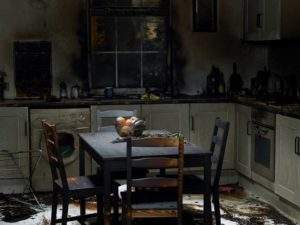How Do You Put out a Grease Fire?

A grease fire happens when cooking oil becomes too hot. As oil heats, it will first begin to boil, then smoke, and finally then it can catch on fire. Most vegetable-based oils have a smoke point at around 450°F, while animal fats typically start smoking around 375°F.
When it comes to a grease fire, the best safety advice we can give is prevention. Whenever you heat oil for pan-frying or deep frying, stay close to the pan. Use a heavy pot with a metal lid and use a thermometer so there is no guesswork in the temperature of the oil.
Keep a watchful eye on the oil as it heats up. If you notice wisps of smoke or smell something abnormal, immediately reduce the heat, or better yet, remove the pan from the burner entirely. The oil likely will not immediately catch fire once it starts smoking, but the smoke is a warning sign that a fire isn’t far off.
What do you do if your pan of oil catches fire?
• Turn the Heat Off – Do not try to move the pot. The burning oil may splash onto you or your kitchen floors or counters.
• Cover the Pot with a Metal Lid – Fires cannot exist without oxygen. With the lid on (and the heat source off), the fire should quickly put itself out. Use a metal lid since glass can shatter.
• Douse Flames with Baking Soda – Sodium bicarbonate will extinguish grease fires, but only if they’re small. It is wise to keep an open box of baking soda next to your stove. Don’t make the mistake of storing it above the stove. You probably won’t be able to reach through flames to get it in case of emergency.
• Use a Class B Dry Chemical Fire Extinguisher – Spray at the base of the flames. This should be a last resort, as fire extinguisher residue will need to be cleaned up by a professional. But obviously, it is better than having your entire kitchen or home consumed with flames.
• Evacuate and Call 911 – If the grease fire does indeed get out of control, don’t try to be a hero. Get out and call 911.
What should you avoid if your pan of oil catches fire?
• Do Not Use Water – Water repels grease, and the splattering effect of these two incompatible liquids will cause the fire to spread.
• Do Not Move the Pot – Throwing the pot outside or into the sink might seem logical in a frenzy, but there are many combustible materials both inside and outside that can catch fire under the burning oil.
• Do Not Use ANYTHING Other than Baking Soda – Ingredients like flour or sugar can make the fire much worse and can actually cause a small explosion. Only baking soda can help put out a grease fire.

